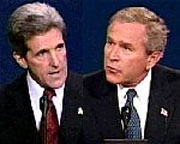 |
|
Bush and Kerry are in a fierce debate.
| |
What's the big question US presidential candidates should be asking
themselves?
Is my name short enough?
You only have to glance at the credits on a Hollywood movie to see the
polysyllabic, ethnic diversity
of surnames in the great melting
pot of the United States.
But when it comes to voting for a president, the gene pool shrinks rapidly, and the
preference is for monikers
that are blunt and Anglo-Saxon.
So if you want to find a way of forecasting who is going to win the
race for the presidency, look at the lengths and origins of their names.
The pattern since World War II has been for candidates with increasingly
short, poster-friendly names. And preferably sounding like they could be
the lead characters in a mini-series.
In the last electoral battle, in 2000, the names couldn't have got any
shorter, with a two-syllable play-off between George Bush and Al Gore.
Perhaps the Republicans have already rumbled this short-name advantage.
In the three decades since Richard Nixon was turfed out of office, Ronald
Reagan has been the only Republican candidate with a surname longer than
one syllable. Coincidence?
This hasn't always been successful. Bob Dole was overrun by the longer-named Bill
Clinton, but again it was by someone with an unassuming surname and there was
only a single syllable difference.
Bill Clinton also has the distinction of being one of only two
presidents since the WWII to have beaten rivals with fewer syllables in
their name. The other was Jimmy Carter, who beat Gerald Ford, in the far
from usual circumstances following Watergate.
Otherwise the candidate with a shorter name has not been defeated. All
of which must be a worrying sign for John Kerry - unless the "Dubya" is
counted as part of his rival's name.
Looking at the candidates' syllable count isn't an entirely frivolous
way of looking at elections, says Barbara Kellerman, research director at
the Center for Public Leadership, in the John F Kennedy School of
Government at Harvard University.
If politics is about brand logos and bumper stickers, then "short and
punchy" names which are highly visible and easy to remember are going to
be an advantage, she says.
When "masculine leadership" is to the
fore, a single syllable name is going to sound "strong,
sturdy and forceful", says Professor Kellerman. "Attention spans are
shrinking with each generation, and in an era of sound-bites having a
short name is going to make a difference. There's something
attention-grabbing about it."
(Agencies) |
美国总统候选人应该问自己的最重要的问题是什么呢?
那就是:我的名字足够短吗?
你只要瞥一眼好莱坞的电影明星,就不难发现在美国这个大熔炉里有许多来自不同种族的多音节姓氏。
但是,轮到选举总统时,候选人的基因库就迅速缩小,那些简单明了的古英语中的名字最容易受到青睐。
所以,如果你想找出一种方法来预测谁将会赢得总统竞选,看看他们名字的长短和来源吧。第二次世界大战以来,候选人的名字越来越短,而且要在广告上看起来亲切。最好听上去像电视短剧中主角的名字。
在上次选举战中,也就是2000年的总统大选中,总统候选人的名字已经短得不能再短了,乔治·布什和阿尔·戈尔之间展开了双音节姓名的最后决赛。。
或许共和党人已经发现了名字简短的优势。在理查德·尼克松被赶出白宫之后的30年间,罗纳德·里根是唯一一个姓氏超过一个音节的共和党候选人。这难道是巧合?
但是,名字简短的候选人也并不总是能够获得成功。鲍勃·杜尔就被比他名字长的比尔·克林顿战胜了,然而“克林顿”本身也是一个谦逊的姓氏,而且和“杜尔”相比也只差一个音节。
第二次世界大战以来只有两位总统战胜了姓氏所含音节比自己少的竞争者,比尔·克林顿有幸成为其中的一位;另一位是吉米·卡特,水门事件后,在极其不同寻常的情况下,他打败了杰拉尔德·福特成为美国总统。
除此之外,名字简短的候选人没有被打败过。所有这些对约翰·克里来说一定是一个令人担忧的迹象,除非布什名字中的W也被算作姓的一部分。
哈佛大学肯尼迪政治学院公共领导中心主任芭芭拉·凯勒曼说考虑竞选人名字所含的音节数不完全是毫无意义的。
她说,如果政治宣传和商标、汽车保险杠上的小标语有相同之处,那么“短而有力的”名字很显眼,而且便于记忆,这将是一种优势。
凯勒曼教授说:“男性领导”已成为既定事实,在这种情况下,单音节的名字听起来会显得“强大、坚定、有力”。他还说:“人们对总统选举的关注程度一代不如一代,在这个生活节奏飞快的时代里,拥有一个简短的名字是至关重要的。它能吸引公众的注意力。”
(中国日报网站译) |
